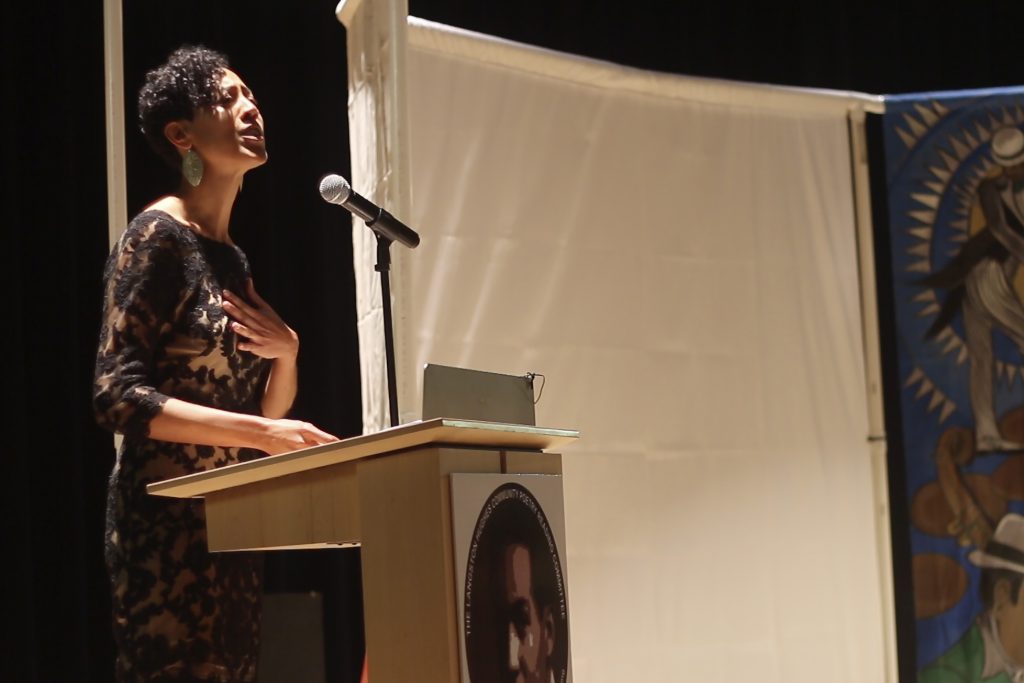
Photo credit: AIJ Media
The sounds of steel pan, keyboard, bass and vocals poured out of the Providence Career & Technical Academy Auditorium as hundreds of standup citizens glided inside. They were there to hear 67 people present Langston Hughes’ works, as well as experience some surprises.
Many attendees returned for a third or 20th visit. Sylvia Ann Soares was presenting for the 12th time in 21 years. She said she was “delighted to see the varied ethnicity reflected in Langston’s poems performed by immigrants and others in their language besides English.” There were beautifully dressed children tuning in and out of the tribute to the poet. There was a touch of harmonica, some snapping, singing, drumming, some blues … and due to careful listening and collaboration, at one point we could hear the “Seascape. “
The event began from the moment one walked into the door, greeted by volunteers of all ages who were professionally welcoming. Old and new friends shook hands and hugged, families milled together, and six generations warmed the auditorium. Deborah Spears Moorehead performed the Opening Song. “A prayer that came to me at 4am,” she explained before blessing the space with “A Prayer for the People.” **
One of the quintessential “community” moments took place next. As April Brown and Valerie Tutson prepared to lead “Lift Ev’ry Voice and Sing,” there came the sound of a stunning 10-month-old baby. Tutson said, “Joya wants to sing the Negro National Anthem,” and she held her baby on stage as the entire congregation sang along with them.
A Biographical Moment, Rochel Garner Coleman first dazzled the crowd by quipping that he thought the preceding invocation was going to be “Ain’t No Stopping Us Now.” Later, when he quoted Hughes, some reflected on the moments of collective guffaws. “Humor is laughing at what you haven’t got when you ought to have it.” This day was one of celebration of Hughes, and it included laughter, joy, pain and contemplation. Rochel described Langston Hughes as “the original jazz” and the “JZ of Harlem.” He gave a detailed list of the vocations and let the listeners know that Langston Hughes was far from just a poet. Rochel eloquently wove wit and knowledge, including the ominous question, “What would [Hughes] think of immigration issues, 1994 Rwanda Genocide…” [Langston Hughes lived on earth until 1967.] All the while, Rochel’s voice and the instrumentals played in tandem. This was an eloquent and thorough account of Langston Hughes delivered with a passion usually reserved for eulogies. This was a birthday party.
Many were curious to get to see and hear the Honorary Poet, Emily Ruth Hazel. She had performed the previous night for Funda Fest’s event “Grown Folk Story Telling.” She submitted to the RFP from Pasadena, California. The next 67 poems (plus Hazel’s) were presented in three different categories. The turnout for an authentic community, in the truest sense of the word, emulates much of what Langston Hughes celebrated in his writing. April Brown explains, “There is an elegance, because of the time period he represents. I wanted it to have a very spiritual component to it.”
As can be expected, not every presenter was able to attend. If Ray Rickman were there, it would have been his 25th year presenting. It seems that most people, once they know about the event, attend, dare it be said, religiously. Sidney E. Okashige couldn’t believe that she had never heard of the event. “Why didn’t I know about such an amazing event?” Well, someone told her, and that someone is writing this article. Spread the word. For those who are a little down or need to reboot their spirits, this is a sanctuary where all faith can be restored. “The power of Langston Hughes’ writing,” as musician Becky Bass stated, along with the inclusive community mentality, were ways in which the Langston Hughes Community Poetry Event is to be revered. There were 10 languages represented onstage, ages from one to ageless and dedicated teenagers who represented their age group with dignity and confidence, executive directors and teachers, visiting artists and families with small children and grandparents, donors and volunteers.
Emily Ruth Hazel talked about how “If you don’t show up, there will be an empty place” and the gentleness of being “swaddled” and how to “practice listening.” She writes about how she “waited to be chosen last” and about “high-profile and highly profiled.” She talked about America and how “you’re welcome here” and an “America still worth singing about.”
As in “Words Like Freedom,” by Langston Hughes, read by Sheila Jackson, it is in our best interest to read these poems, to talk about them, and to listen to them.


